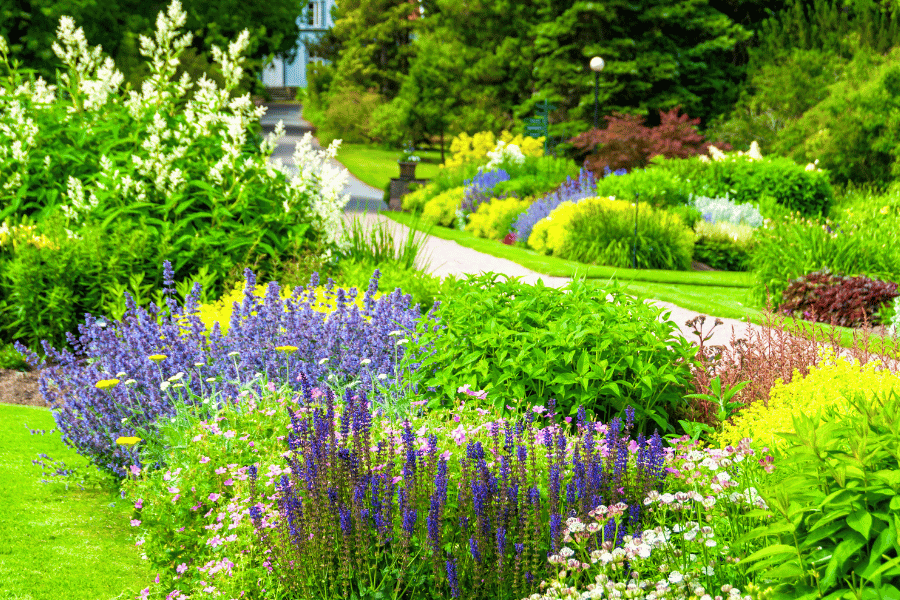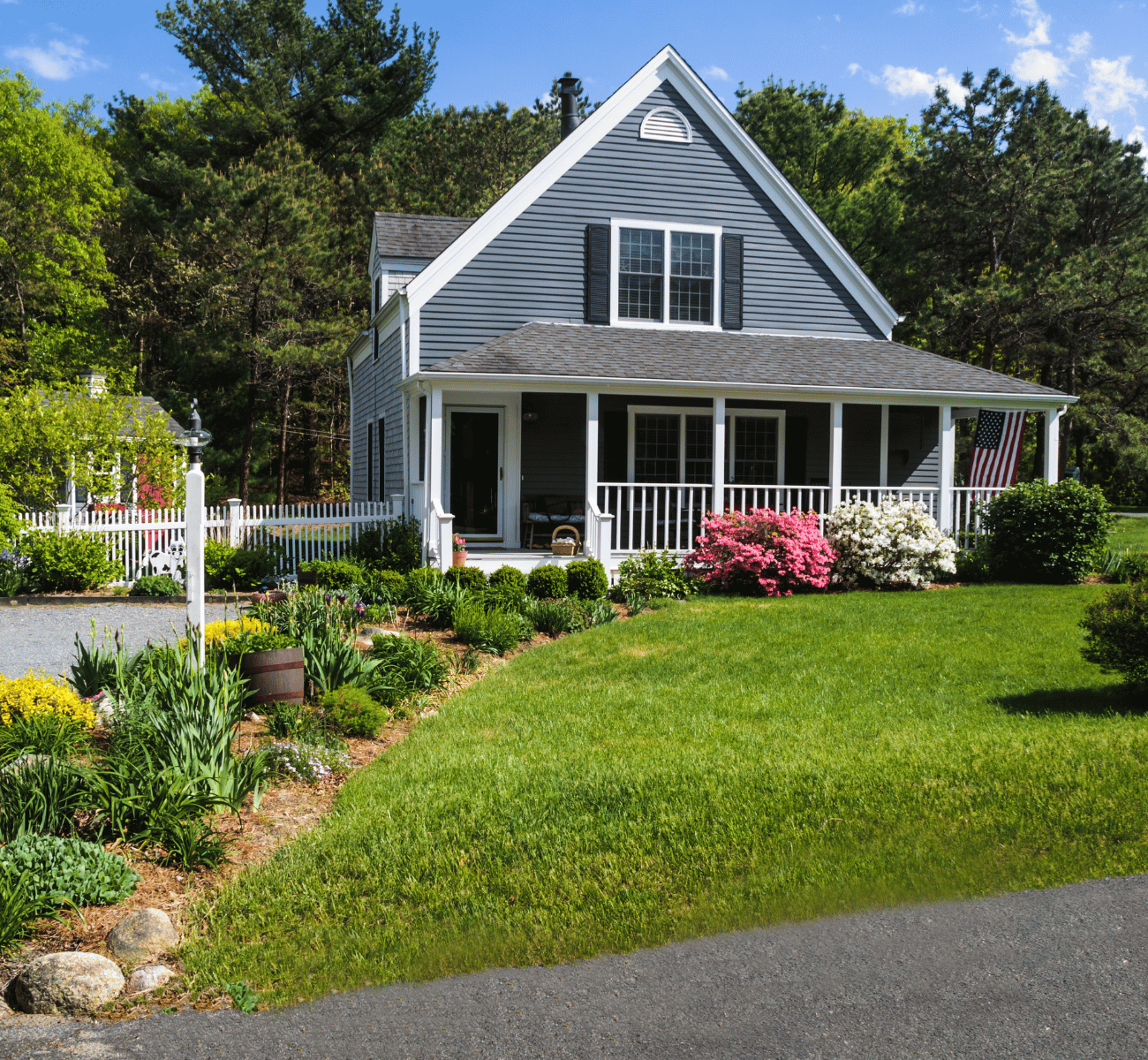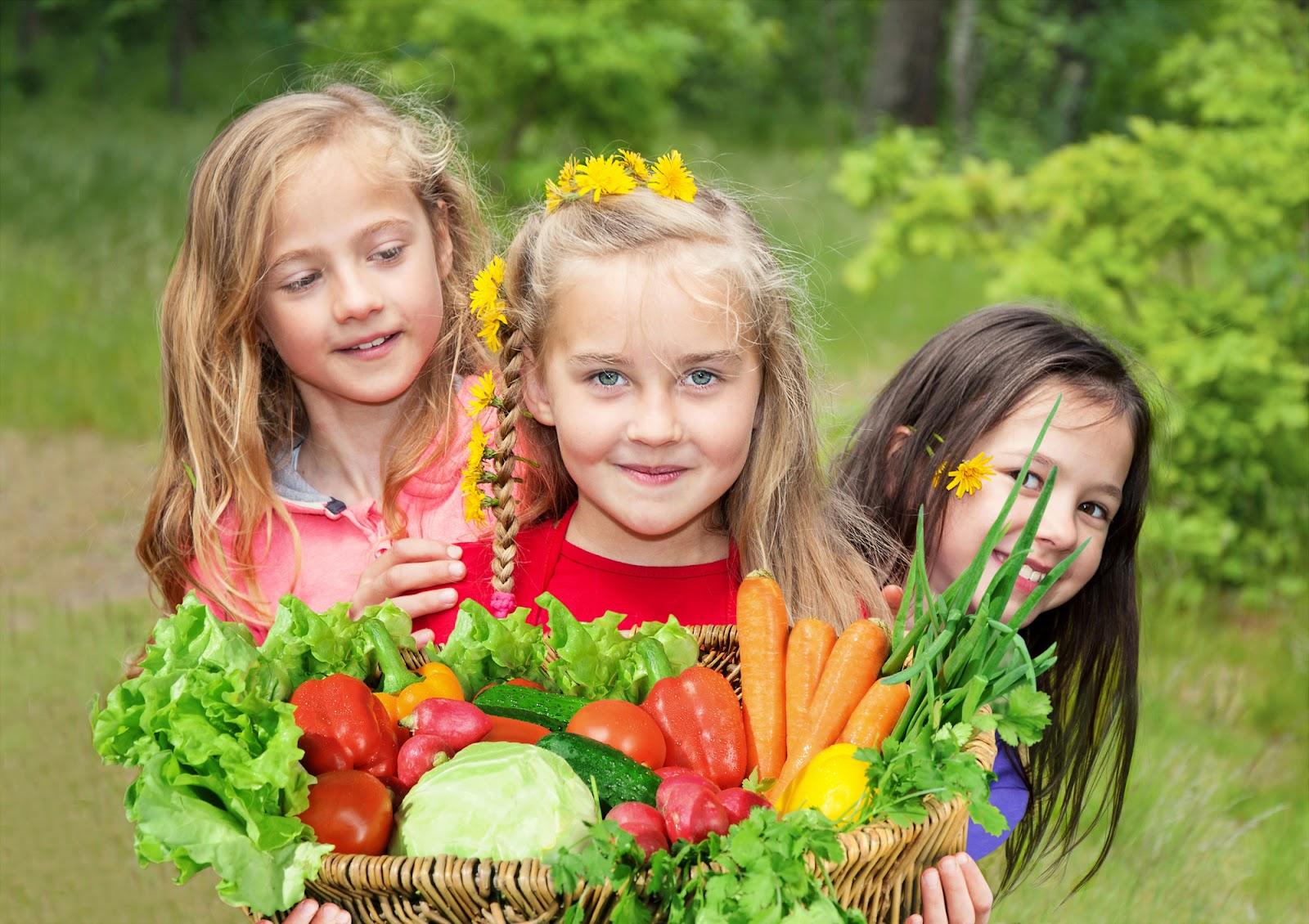10 Tips To Help Your Garden Survive Summer
February 29th, 2024
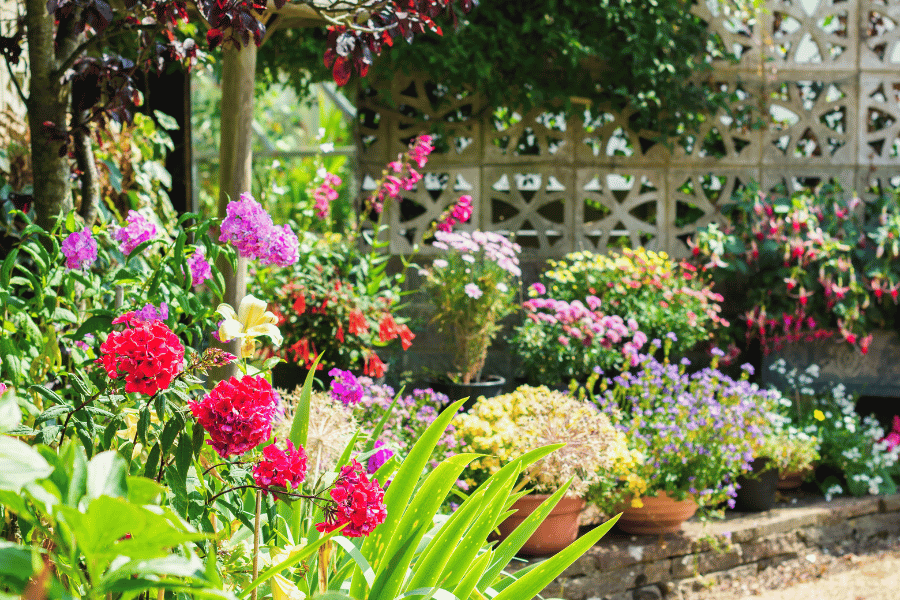
Summer Gardening Tips
Are you wondering how to keep your garden alive in the summer heat? Here are ten tips to help your garden survive summer!
As the warmer months approach, it is time to start thinking about the spring planting season and how to keep your garden plants alive once summer comes around.
Gardening is one of the best outdoor activities you can do in the Triangle and can be a great way to get the whole family involved. Whether you want to build garden beds in your backyard or plant beautiful flowers in pots, learning how to keep your plants alive and thriving is an essential part of the gardening process.
No matter what plants you want to grow or what gardening trends you want to follow, the summer season in Raleigh and the Triangle area is generally very hot and humid which can do damage to your plants without proper precautions.
Follow these ten summer gardening tips
Chapters
1. Choose the Right Plants
If you want to start a garden that flourishes and can withstand the high summer heat, then you need to plant your garden at the right time and look for varieties of plants that are known to do well in the area where you live.
One of the most important things to consider when choosing plants is climate. If you live in a warm climate, particularly in an area that experiences very warm summers, you must choose plants that can handle the conditions.
Planting at the right time of the year will create healthy plants that are well-established and are known to take the heat. While this depends on where you live, the best time to plant warm-season crops if you live in Raleigh is after the last average frost date, usually from late March to the end of April.
The best warm summer annual vegetable plants that thrive in temperatures over 70 degrees Fahrenheit are tomatoes, sweet potatoes, squash, peppers, pumpkin, okra, corn, cucumbers, cantaloupe, beans, eggplant, summer peas, and watermelon.
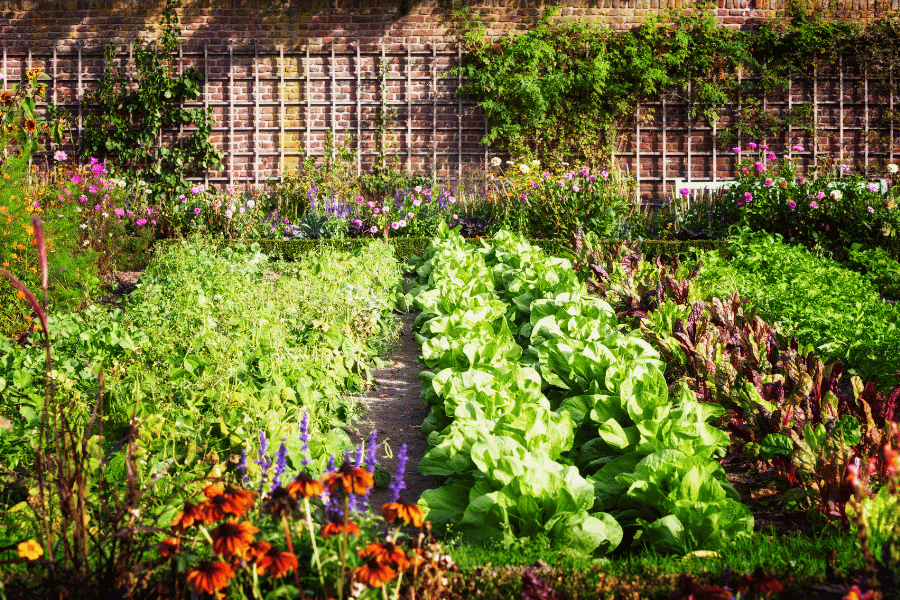
2. Water Correctly
Watering is essential to keeping your garden alive in the heat. Watering your garden should occur daily; the best time to do it is in the morning, generally between 6 AM and 10 AM when it is cooler. Watering in the late evening, right before bed, is another option if you do not have time in the morning.
During really hot weather, plants in your garden that are not in pots must be watered deeply to stay alive and moist. This means that you should deeply water at least three times a week. If your plants are only seedlings, they should be watered twice daily until they are established.
Avoiding watering in full sun is advised since the water will evaporate before reaching the soil. Not only can your plants wilt and die due to improper watering, but it can also lead to leaf scorch, where spots appear on the leaf and are burned.
For a small garden, a watering can or a hose that allows you to water at the soil level will work fine. If you have a larger garden, it might be a good idea to consider drip irrigation so the water can directly reach the roots.
Plants in pots or baskets are easier to dry out, so watering them twice to three times a day is a good rule of thumb. You will know when a plant needs water when the first two inches of potting soil is dry.
Watering your garden during the summer is a great way to involve the whole family, especially if you are gardening with kids.
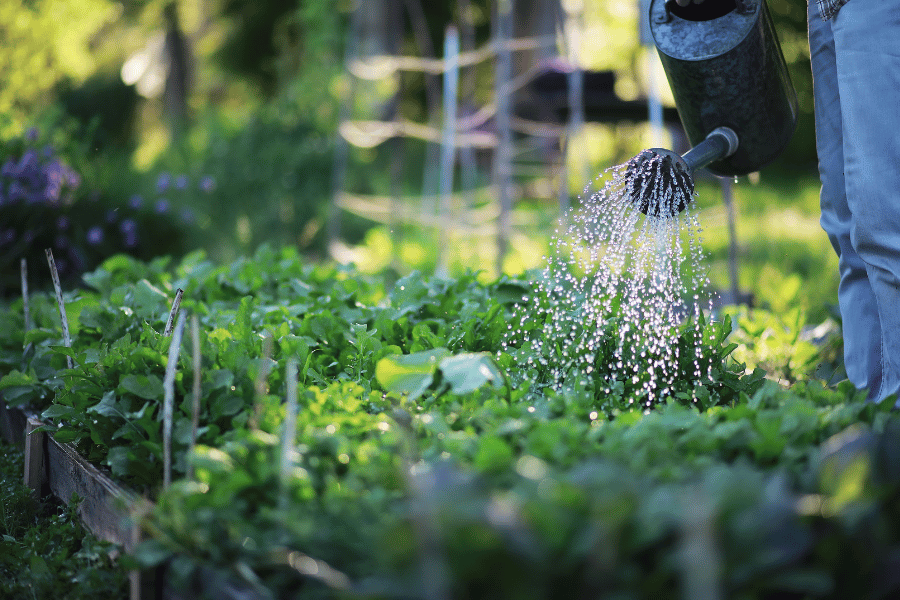
3. Avoid Pruning
One of the best ways to maintain a healthy garden is by pruning. The best time of the year to prune your garden plants is in early spring, right before the plant reaches a growth spurt, in order to remove any dead, diseased, or damaged stems and parts of the plant.
While pruning is essential for a garden's health and beauty, it is not a good idea to prune plants during periods of high heat. Pruning or thinning plants in the summer can expose healthy parts of the plant to the sun that were previously protected by the damaged foliage.
Since pruning stimulates new growth, removing stems and branches can lead to heat damage to the new growth of the plant. It is best to avoid this possibility altogether.
If you need to prune in the summer, ensure it is not during direct sun or extreme heat periods. Pruning should be light to avoid scorch, and plants must be well-hydrated beforehand.
4. Provide Shade
If you want to decrease the amount of direct sunlight and intense heat beating down on your plants, you might want to consider providing shade. During the hottest months of the year, providing shade can help keep your plants healthy and happy.
Even though sunlight is good for your plants, in extreme heat and direct sunlight, your plants will be susceptible to wilting, sunburn, and possibly even death. Temperatures that reach above 90 degrees can stress out a plant, and providing shade can help keep the area up to 10 degrees cooler, which can go a long way for a summer garden.
Shade cloths are an easy-to-use, effective, and affordable solution to protect plants and seedlings from extreme levels of heat and sunlight. Made for growers of all experience levels, adding shade will not only benefit the garden but also the gardener by creating a cooler outdoor space.
Some shade-tolerant crops include salad greens, leafy greens, root vegetables, peas and beans, leeks and onions, and herbs.
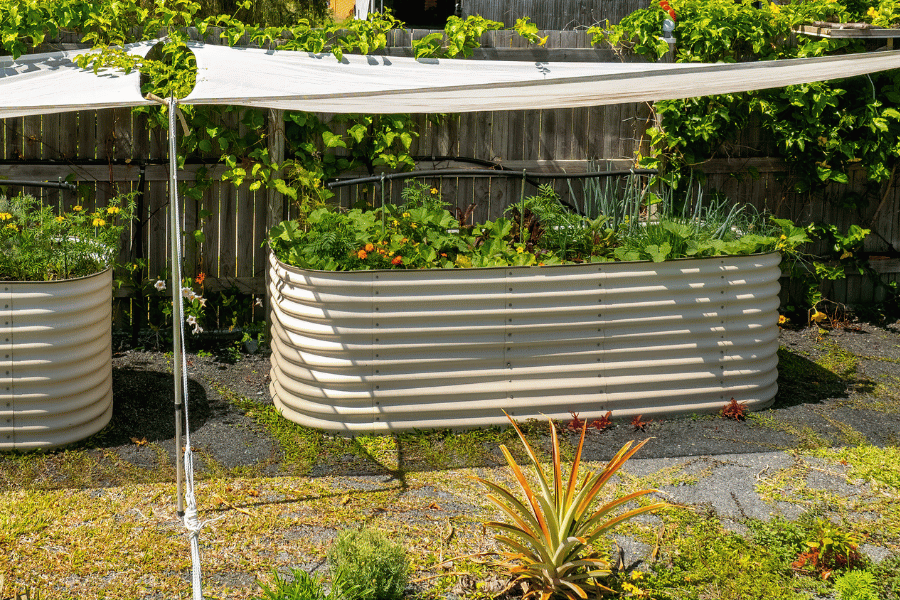
5. Use Mulch
Adding mulch to your garden is a great way to beat the summer heat. Mulch acts as an insulator and security blanket for plants during a heat wave, which means that it will keep the soil cooler while helping with soil moisture retention and suppressing weeds.
A great addition to any vegetable garden, applying mulch will encourage plants to grow and flourish even in the middle of summer. If you decide to add mulch to your garden, make sure that the mulch is not hugging the plant stems since too much mulch applied can suffocate the plant.
6. Watch Out For Wind
Summer brings high temperatures and an increased risk of thunderstorms and winds. In Raleigh, in particular, intense rain and strong winds during the summer months can be enough to damage a healthy garden.
In order to protect your garden from strong wind, it is important to set up wind barriers around your garden beds. Trees, bushes, shrubs, and heavy bags of potting soil, rocks, or sand can be used as a wind barrier. Large plants can also be wrapped in burlap and secured with twine or string.
7. Reduce Fertilizer
Fertilizers can be organic or inorganic and are usually made of high nutrient content to promote healthy plant growth in flowers and fruit, nut, or seed production.
The best time to use fertilizer is during the spring planting season when the plant is first getting established and still needs a boost of nutrients to grow. During the hot summer months, it is recommended not to use fertilizer at all since it will lead to more water and nutrient needs for the plant, which can be hard to come by in extreme heat.
Summer fertilizing can do more harm than good since the plant can be hard to keep up with as it continues to grow in unfavorable conditions. Over-fertilizing can lead to nutrient imbalance in the soil and harm the plant's health.
8. Protect Your Pots
It is important to keep potted plants safe in the summer since they are more at risk in high heat. Luckily, potted plants are easy to move into the shade if needed, but they tend to dry out quicker and will require watering multiple times a day in the summer.
9. Add Compost
Compost is a fantastic way to keep your summer garden looking its best. Compost improves garden soil by adding essential nutrients, combats weeds, and helps increase the soil's ability to hold moisture and drain effectively.
Adding compost is recommended during the spring planting season, but incorporating an extra layer of compost in mid-summer will only help feed your plants and encourage growth for your flower and vegetable garden.
Compost is easy to make at home and can consist of fruit and vegetable peelings, coffee grounds, egg shells, and yard trimmings.
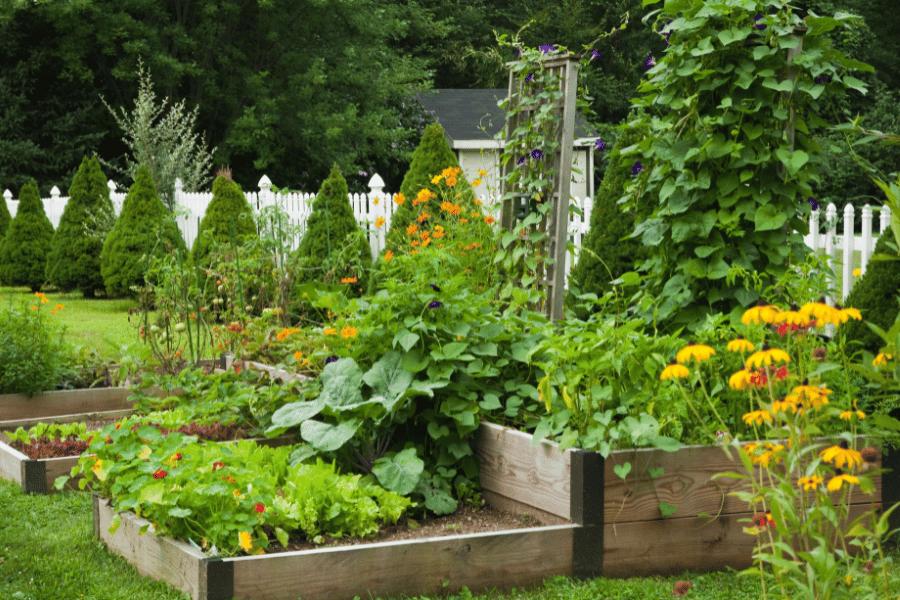
10. Get Rid of Weeds
Getting rid of the weeds in your garden is a great way to boost curb appeal and maintain the growth and beauty of the plants in your garden beds. Weeds compete with your plants for nutrients, sunlight, and water, which can reduce growth.
By eliminating weeds, you will protect your plants and reduce any risk of potential hazards. A weed-free garden ensures that your plants receive all the water and nutrients they need to grow.
Weeding also eliminates the risk of pests and diseases entering your garden and causing damage. High temperatures and dry conditions can cause an increase in weed growth during the summer, and some of the best ways to treat them are either by hand pulling the weeds or through spot treatments.
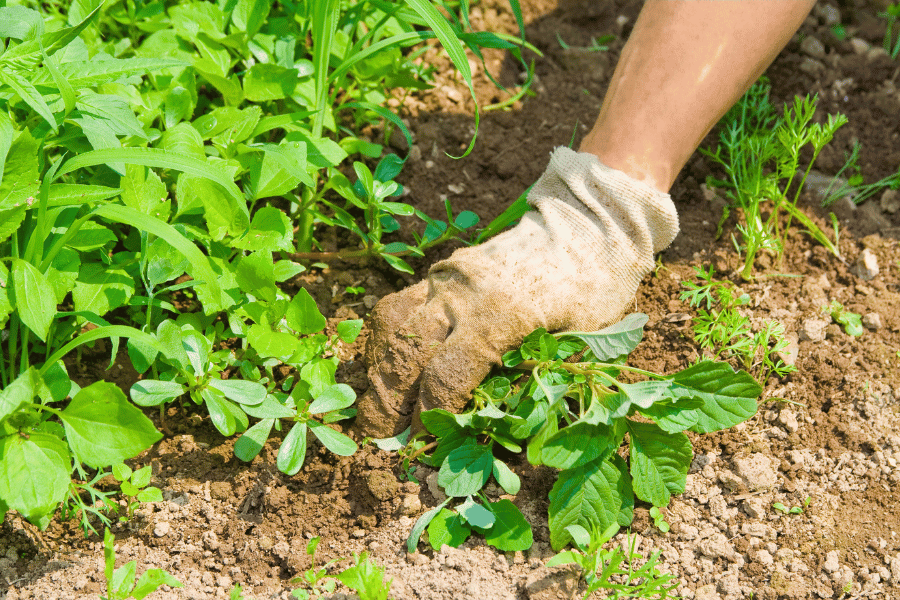
Methodology
We used data and information from multiple reliable sources to determine the best tips to help your garden survive summer. A few sources that we used include NCSU, Farmers' Almanac, Chicago Tribune, Carolina Farm Stewardship Association, and Almanac.
FAQs
How do you keep a garden alive in extreme heat?
To keep your garden alive and protect your plants from extreme heat, it is important to water your plants deeply to stay moist for as long as possible and follow the above summer garden tips.
What temperature is too hot for vegetable plants?
Most vegetable plants tend to shut down in extreme heat, and generally, when temperatures rise above 90 degrees Fahrenheit, leaves will wilt.
Should you water your garden in extreme heat?
In extreme heat, the plants in your garden will need more water than usual, so it is important to water your garden daily or at least every other day.
Tips To Help Your Garden Survive Summer - Final Thoughts
There are many benefits of having a summer garden which include easy access to nutritious fruits and vegetables, relieving stress as you spend more time outdoors, and improving overall physcial health by encouraging you to move around as you take care of your plants.
Gardening is a true labor of love and as the high heat of summer rolls around, you want to make sure that you know how to properly take care of the plants that you spent so much time and energy growing.
If are moving to Raleigh and can not wait to start your own garden, contact one of the experts at Raleigh Realty. We can help you find the home of your dreams with enough backyard space to grow your own flowers, fruits, and vegetables.

Ryan Fitzgerald
Hi there! Nice to 'meet' you and thanks for visiting our Raleigh Real Estate Blog! My name is Ryan Fitzgerald, and I'm a REALTOR® in Raleigh-Durham, NC, the owner of Raleigh Realty. I work alongside some of the best Realtors in Raleigh. You can find more of my real estate content on Forbes, Wall Street Journal, U.S. News and more. Realtor Magazine named me a top 30 under 30 Realtor in the country (it was a long time ago haha). Any way, that's enough about me. I'd love to learn more about you if you'd like to connect with me on Facebook and Instagram or connect with our team at Raleigh Realty. Looking forward to connecting!
Related Blogs
![Top 7 Gardening Statistics and Trends [2024]](https://raleighrealtyhomes.com/storage/blogs/February2024/2zT7961lEQlSkZrgCVSj.png)
